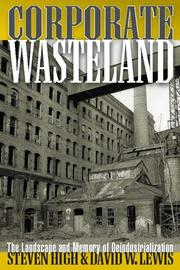| Listing 1 - 5 of 5 |
Sort by
|
Book
ISBN: 9780774828949 0774828943 9780774828956 0774828951 9780774828925 0774828927 Year: 2015 Publisher: Vancouver Toronto
Abstract | Keywords | Export | Availability | Bookmark
 Loading...
Loading...Choose an application
- Reference Manager
- EndNote
- RefWorks (Direct export to RefWorks)
Survivors of terrible events are often portrayed as unsung heroes or tragic victims but rarely as complex human beings whose lives extend beyond the stories they have told. Beyond Testimony and Trauma considers other ways to engage with survivors and their accounts based on insights gained from long-term oral history projects in a variety of contexts, including factory closures, industrial injury, eugenics and forced sterilization, the Holocaust, genocide in Rwanda and Cambodia, Argentinian torture camps, the Yugoslav Wars, and Jewish emigration from the Maghreb. The contributors, all innovators in the field of oral history, include Henry Greenspan who provides reflections from forty years of listening to Holocaust survivors as well as an insightful afterword. They demonstrate that – through deep listening, long-term relationship building, and collaborative research design – it is possible to move beyond the problematic aspects of “testimony” to shine light on the more nuanced lives of survivors of mass violence. In the process, they offer alternative approaches to the collection of oral history that will shake the foundations of current historiographical practice.
Oral history. --- Oral biography. --- Victims. --- Survival. --- Survival after airplane accidents, shipwrecks, etc. --- Survival skills --- Persons --- Biography --- History --- Oral biography --- Oral tradition --- Methodology --- Montreal Life Stories Project
Book
ISBN: 1283530287 9786613842732 0773581103 9780773581104 9781283530286 6613842737 9780773537507 0773537503 Year: 2010 Publisher: Montreal Ithaca McGill-Queen's University Press
Abstract | Keywords | Export | Availability | Bookmark
 Loading...
Loading...Choose an application
- Reference Manager
- EndNote
- RefWorks (Direct export to RefWorks)
In January 1941, the hulking twenty-one thousand ton troopship Edmund B. Alexander docked in St John's harbor, carrying a thousand American soldiers sent to join the thousands of Canadian troops protecting Newfoundland against attack by Germany. France had fallen, Great Britain was fighting for its survival, and Newfoundland - then a dominion of Britain - was North America's first line of defence. Although the German invasion never came, St John's found itself occupied by both Allied Canadian and American forces.
World War, 1939-1945 --- Civil-military relations --- History --- St. John's (N.L.) --- History, Military --- Strategic aspects
Book
ISBN: 9780228012313 Year: 2022 Publisher: Montreal, Quebec : McGill-Queen's University Press,
Abstract | Keywords | Export | Availability | Bookmark
 Loading...
Loading...Choose an application
- Reference Manager
- EndNote
- RefWorks (Direct export to RefWorks)
Deindustrializing Montreal challenges the deepening divergence of class and race analysis by recognizing the intimate relationship between capitalism, class struggles, and racial inequality in historically white Point Saint-Charles, and multiracial Little Burgundy, home to the city's English-speaking Black community.
Deindustrialization. --- Economic history. --- 1900-1999 --- Montréal (Québec) --- Economic conditions --- Race relations --- History --- Social conditions --- Black History. --- Gentrification. --- Heritage. --- Industrial Culture. --- Lachine Canal. --- Little Burgundy. --- Montreal. --- Negro Community Centre. --- Neighbourhood. --- Oral. --- Pointe-Saint-Charles. --- Postindustrialism. --- Racial Capitalism. --- Urban Renewal. --- Working-Class.
Book
ISBN: 9780228010753 0228010756 Year: 2022 Publisher: Montreal : McGill-Queen's University Press,
Abstract | Keywords | Export | Availability | Bookmark
 Loading...
Loading...Choose an application
- Reference Manager
- EndNote
- RefWorks (Direct export to RefWorks)

ISBN: 0801474019 9780801474019 Year: 2007 Publisher: Ithaca: IRL press,
Abstract | Keywords | Export | Availability | Bookmark
 Loading...
Loading...Choose an application
- Reference Manager
- EndNote
- RefWorks (Direct export to RefWorks)
Milton Academy Sex Scandal, Milton, Mass., 2005 --- Deindustrialization --- Deindustrialization --- Plant shutdowns --- Plant shutdowns --- Industrial sites --- Industrial sites --- Industrial buildings --- Industrial buildings
| Listing 1 - 5 of 5 |
Sort by
|

 Search
Search Feedback
Feedback About UniCat
About UniCat  Help
Help News
News